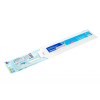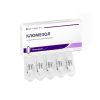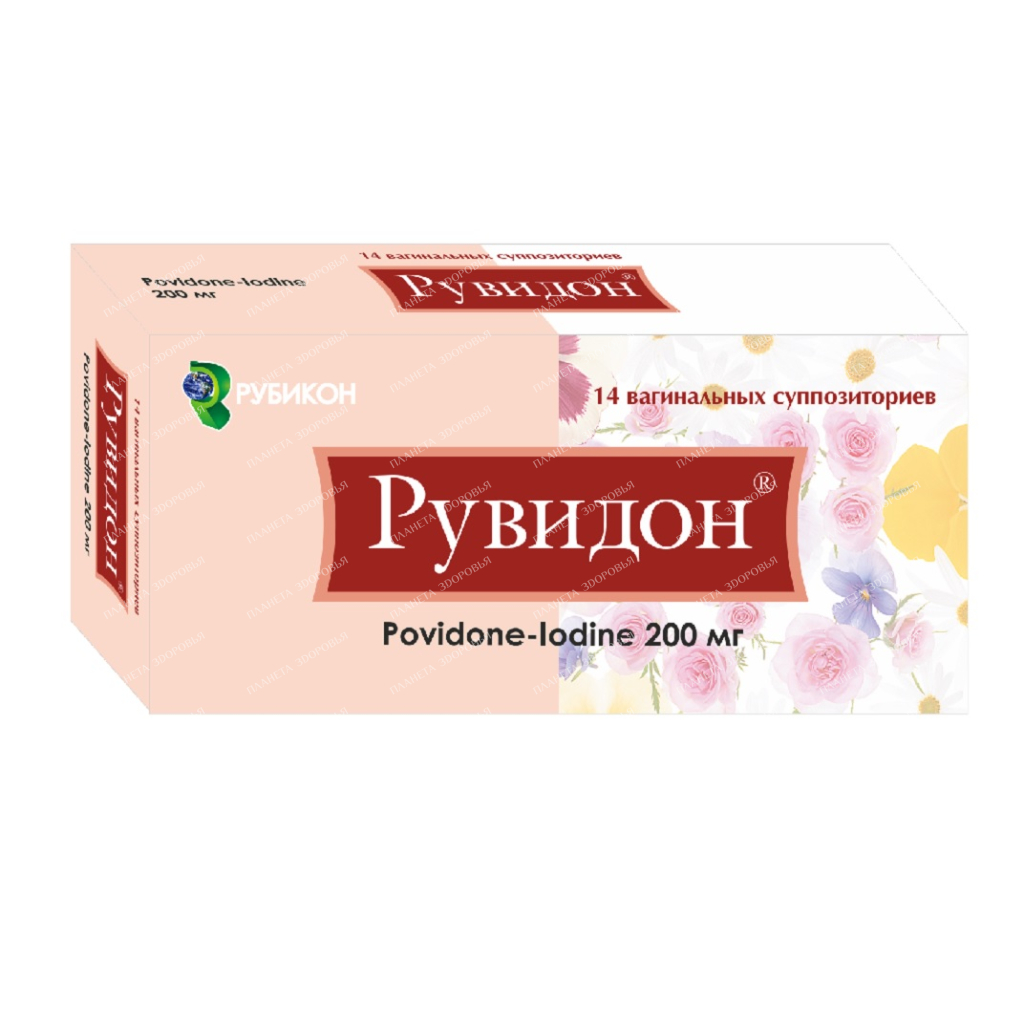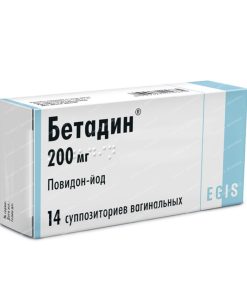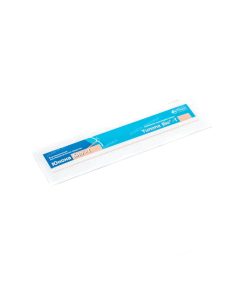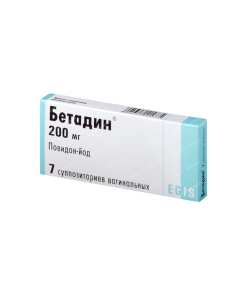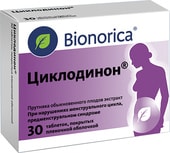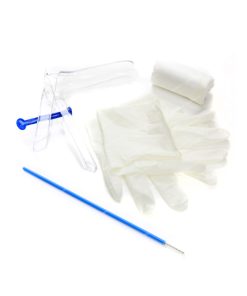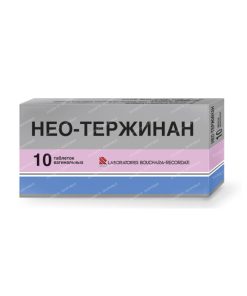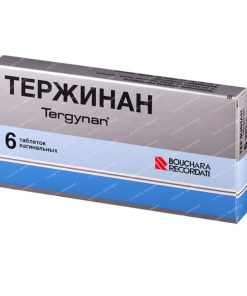Name:
Ruvidon supp. vag. 200 mg in a cell. pack No. 7×2
Description:
Torpedo-shaped homogeneous suppositories of dark brown color. The presence of dark blotches and a funnel-shaped recess is allowed. On the longitudinal section, the presence of an air rod is allowed. The main active ingredient Povidone-iodine Release form Vaginal suppositories Dosage 200 mg Indications for use Acute and chronic vaginitis (mixed, non-specific infections); bacterial vaginosis (caused by Gardnerella vaginalis); fungal infections caused by Candida albicans, including candidiasis, due to antibiotic and steroid treatment; trichomonas colpitis (in combination with systemic therapy); preoperative and postoperative treatment (for the purpose of prevention) before and after surgical operations on the vagina, as well as obstetric and diagnostic procedures. Dosage and administration The suppository should be removed from the shell and inserted deep into the vagina. The course of treatment for vaginitis is usually 7 days, 1 suppository. In case of insufficient effectiveness, the course of treatment can be extended for another 7 days, and the daily dose can be increased to 2 suppositories. For persistent infections with a long course, therapy can be extended up to 3 weeks. The duration of treatment depends on the results of therapy and is determined by the doctor individually, the course of treatment should be continuous. Before surgical interventions and diagnostic procedures – 1 suppository per day for several days before surgery. To ensure maximum dissolution of the active substance, as well as to avoid local irritation, it is imperative to moisten the suppository with water before administration. If menstruation occurs during treatment, then the use of suppositories should not be interrupted, treatment can be continued regardless of the phase of the menstrual cycle. During the use of suppositories, the use of sanitary pads is recommended. Fly and adolescents The use of Ruvidon® vaginal suppositories is contraindicated in children under 12 years of age. Elderly patients In elderly patients, the dosage does not change. Patients with impaired liver and kidney function In patients with impaired liver or kidney function, the dosage does not change. Use during pregnancy and lactation There are proven risks to the human fetus with prolonged use of iodine-containing drugs after the first trimester. Iodide crosses the placental barrier and can cause changes in the thyroid gland or goiter in the fetus and newborn. Iodine is excreted in breast milk. The use of povidone-iodine during pregnancy and lactation is not recommended unless absolutely necessary. In the future, it is recommended to check the function of the thyroid gland in newborns. Suppositories Ruvidon® have a spermicidal effect, therefore, their use in persons planning a pregnancy is not recommended. The ability to influence the reaction rate when driving vehicles or working with other mechanisms The use of the drug does not affect the ability to drive vehicles and work with mechanisms. Precautions The use of povidone-iodine may reduce the absorption of iodine by the thyroid gland, which may affect the results of some diagnostic tests (determination of protein-bound iodine, diagnostic procedures using radioactive iodine, thyroid scintigraphy). Also, povidone-iodine can interact with iodine preparations used to treat thyroid disorders. After stopping the use of povidone-iodine, an interval of at least 1-2 weeks should be maintained. The oxidizing effect of povidone-iodine can lead to false positive results in various diagnostic tests (occult blood in the feces, blood or glucose in the urine). In patients with thyroid diseases, such as goiter, nodular goiter, and other non-acute thyroid diseases, the administration of significant amounts of iodine can cause hyperthyroidism. In such patients, the use of povidone-iodine should be time-limited if possible. At the end of treatment, patients should be monitored for early symptoms of hyperthyroidism and, if necessary, monitor thyroid function. Avoid getting the drug in the eyes. Coloring on skin and fabrics is easily washed off with water. Use in children: For children under 12 years of age, the use of Ruvidon® vaginal suppositories is contraindicated. May be used in girls aged 12 years and older, with caution when administered to virgins. Use in patients with renal or hepatic insufficiency: Special care is required with regular use of the drug in patients with renal or hepatic insufficiency. Interaction with other drugs Incompatible with disinfectants containing mercury, with enzyme ointments, with oxidizers and alkali salts. Regular use of Ruvidon® vaginal suppositories should be avoided in patients receiving lithium preparations. The appointment of lithium carbonate together with iodine-containing drugs can cause severe hypothyroidism. The combined use of povidone-iodine and hydrogen peroxide, as well as enzyme preparations containing silver and tauloridine, for the treatment of wounds, as well as antiseptic preparations, leads to a mutual decrease in effectiveness. Gynecological antiseptics can inactivate topical spermicides and interfere with their contraceptive activity. Contraindications hypersensitivity to iodine and other components of the drug; hyperthyroidism and other severe thyroid dysfunction, thyroid adenoma; dermatitis herpetiformis Dühring; simultaneous use of radioactive iodine for the purpose of diagnosis or treatment; pregnancy, lactation; children’s age up to 12 years. One suppository is composed of: active substance: povidone-iodine – 200 mg (active iodine content 20 mg); excipient: macrogol 1000 – 2800 mg. OverdoseSymptoms For acute iodine intoxication, the following symptoms are characteristic: a metallic taste in the mouth, increased salivation, burning or pain in the mouth or throat; irritation and swelling of the eyes; skin reactions; gastrointestinal disorders; impaired renal function, anuria; circulatory failure; laryngeal edema with secondary asphyxia, pulmonary edema; metabolic acidosis, hypernatremia. Treatment Symptomatic and supportive therapy should be carried out with particular attention to electrolyte balance, renal and thyroid function. Side effects Information on adverse reactions is presented in accordance with the system-organ classification and frequency of occurrence. The frequency of occurrence was determined according to the following scheme: very often (? 1/10), often (? 1/100, but < 1/10), infrequently (? 1/1000, but < 1/100), rarely (? 1/100). 10,000 but < 1/1,000), very rare (< 1/10,000), frequency unknown (cannot be estimated from available data). Immune system disorders: Rare: hypersensitivity; Very rare: anaphylactic reactions. Endocrine disorders: Very rare: hyperthyroidism (sometimes accompanied by tachycardia or restlessness)*; Frequency unknown: hypothyroidism* * *. Metabolic and nutritional disorders: Frequency unknown: electrolyte imbalance**, metabolic acidosis**. Skin and subcutaneous tissue disorders: Rare: contact dermatitis (eg, erythema, small vesicles, pruritus); Very rare: angioedema. Renal and urinary tract disorders: Frequency not known: acute renal failure**, blood osmolarity disorders**. * - may occur in patients with existing thyroid disease (see Precautions section) after the use of iodine in significant amounts (for example, with long-term use of povidone-iodine for the treatment of wounds or burns). ** - can be observed after the use of povidone-iodine in significant quantities (for example, in the treatment of burns). *** - hypothyroidism may occur after prolonged use of povidone-iodine or its use in large quantities. Storage conditions Store at a temperature not exceeding 15 ° C in the original packaging (carton box). Keep out of the reach of children! Buy Ruvidon vaginal suppositories 200mg No. 7x2 Price for Ruvidon vaginal suppositories 200mg No. 7x2
| INN | povidone-iodine |
|---|---|
| The code | 43 310 |
| Barcode | 4 810 243 001 919 |
| Dosage | 200mg |
| Active substance | Povidone-iodine |
| Manufacturer | Rubicon LLC, Belarus |
 Free worldwide shipping on orders $99+
Free worldwide shipping on orders $99+  US: temporary delays — postal services aligning new import rules,
US: temporary delays — postal services aligning new import rules,  EU: 1–2 weeks,
EU: 1–2 weeks,  Worldwide: 1–4 weeks
Worldwide: 1–4 weeks 

